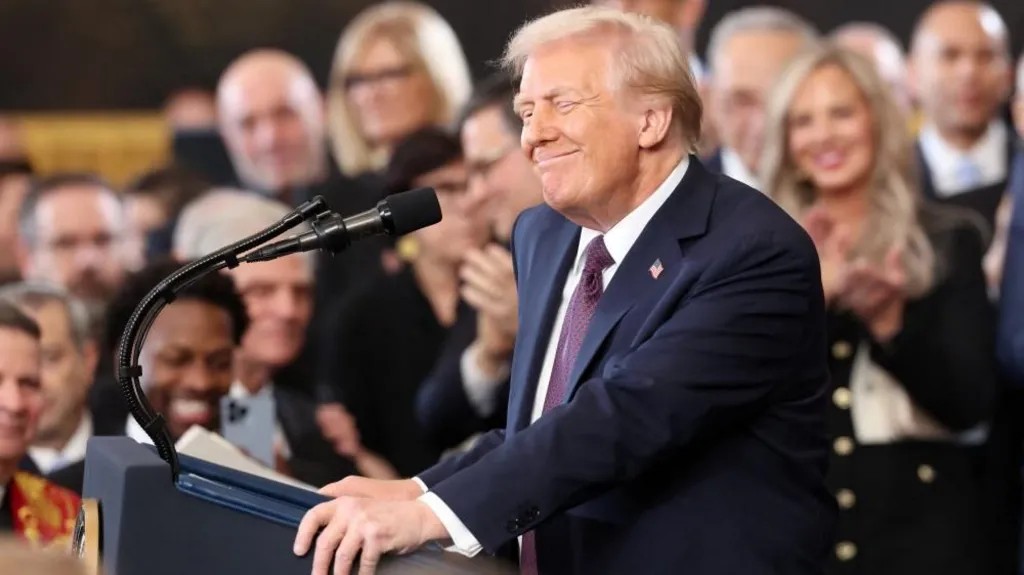Daud Olatunji
Donald Trump was sworn in as the 47th President of the United States on Monday during a historic ceremony held inside the Capitol Rotunda due to inclement weather.
The event marked his unprecedented return to the White House, making him the first president since Grover Cleveland to serve non-consecutive terms.
In his inaugural address, Trump unveiled an ambitious and controversial agenda focusing on gender identity, immigration reform, economic restructuring, and energy policies. His fiery rhetoric and bold proclamations set the tone for what many anticipate to be a turbulent second term.
Trump declared that his administration would officially recognize only two genders—male and female—effectively dismissing transgender, non-binary, and other gender identities.
“This week, I will end the government policy of engineering race and gender into every aspect of public and private life. Henceforth, it will be the official policy of the United States government that there are only two genders: male and female,” Trump stated emphatically.
Trump’s inauguration speech also signaled an aggressive approach to border control.
Declaring a national emergency at the southern border, he announced a series of measures to combat illegal immigration, including reinstating the controversial “Remain in Mexico” policy and ending catch-and-release practices.
“All illegal entry will be halted, and we will begin the process of returning millions of criminal aliens. Troops will secure our borders to repel this invasion,” Trump declared.
He also vowed to designate cartels as foreign terrorist organizations, invoking the Alien Enemies Act of 1798 to dismantle criminal networks.
In a move that has raised alarms globally, Trump announced a national energy emergency aimed at boosting domestic oil and gas production.
He promised to leverage America’s vast energy resources, end the Green New Deal, and revoke electric vehicle mandates.
“America will be a manufacturing nation once again. We will use our liquid gold—oil and gas—to bring prices down, fill our reserves, and export energy worldwide,” Trump declared.
This policy shift poses a significant threat to Nigeria, whose economy heavily depends on crude oil exports.
The United States, a major importer of Nigerian oil, has significantly reduced its reliance on foreign oil in recent years due to advancements in shale production.
Dr. Muda Yusuf, CEO of the Centre for the Promotion of Private Enterprise, warned that Trump’s policies could further erode Nigeria’s oil revenue.
“If energy prices fall, it will negatively impact Nigeria’s revenue. However, it could benefit businesses by reducing the cost of petroleum products such as petrol and diesel,” he explained.
Energy analyst Dr. Bala Zakka emphasized the need for Nigeria to expand its refining capacity, stating, “Trump’s policies could encourage Nigeria to refine more petroleum products locally, reducing dependency on crude oil exports and adding value to the economy.”
Trump also framed his return to power as divinely ordained, referencing a failed assassination attempt during his campaign.
“I was saved by God to make America great again,” he said, recounting how an assassin’s bullet narrowly missed him in Pennsylvania.
This revelation adds a dramatic chapter to Trump’s political journey, further cementing his narrative of resilience and destiny.
In addition to energy policies, Trump announced plans to overhaul the trade system, introducing an “External Revenue Service” to collect tariffs from foreign countries.
This initiative aims to reduce the economic burden on U.S. taxpayers while reviving the nation’s manufacturing sector.
“I will immediately begin the overhaul of our trade system to protect American workers and families,” Trump declared, promising to make America a manufacturing hub once again.
Trump pledged sweeping reforms in healthcare and education, highlighting inadequacies exposed by recent natural disasters.
He also announced the creation of a Department of Government Efficiency to address inflation, high costs, and inefficiencies in governance.
Trump’s inauguration and policy announcements have drawn mixed reactions both domestically and internationally.
While his supporters view his return as a victory for conservative values, critics warn of potential global repercussions, particularly in the areas of human rights and energy markets.
For Nigeria, Trump’s energy policy presents both a challenge and an opportunity. Experts urge the Nigerian government to diversify its economy and reduce dependence on oil revenues.
The Oil and Gas Service Providers Association of Nigeria (OGSPAN) has called for investments in refining capacity, while the Petroleum Products Retail Outlets Owners Association of Nigeria (PETROAN) expressed optimism about domestic fuel supply stability.
Do you want to share a story with us? Do you want to advertise with us? Do you need publicity for a product, service, or event? Contact us on WhatsApp +2348183319097 Email: platformtimes@gmail.com
We are committed to impactful investigative journalism for human interest and social justice. Your donation will help us tell more stories. Kindly donate any amount HERE


